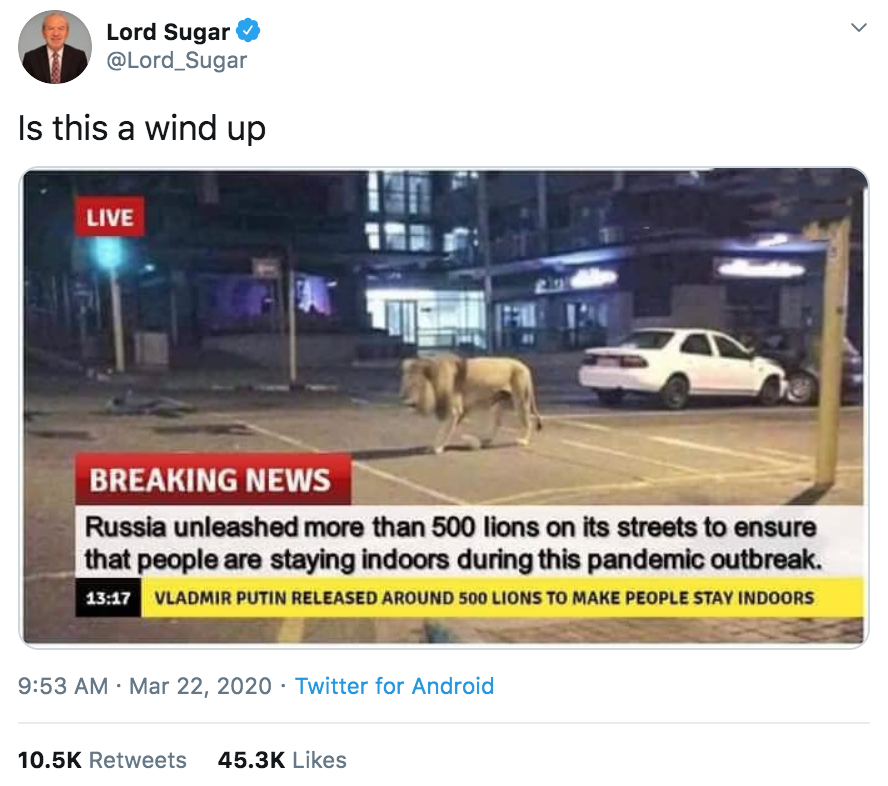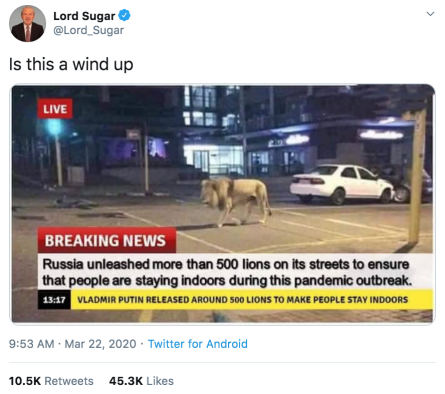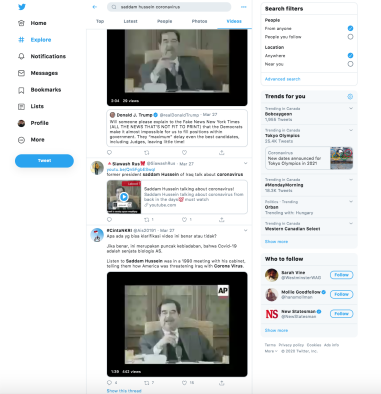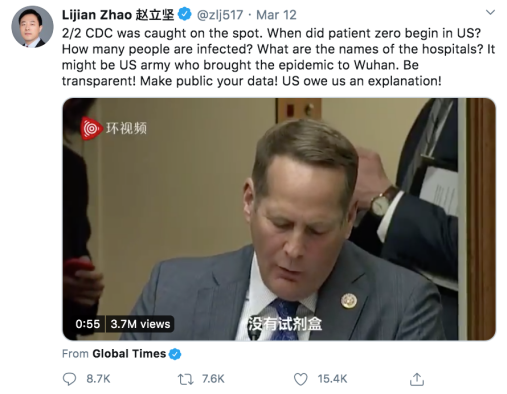
Vladimir Putin has released hundreds of lions and tigers on to the streets of Russia to enforce self-isolation. Hollywood celebrities are not being diagnosed with coronavirus – they are actually being arrested for paedophilia offences. The US was threatening Iraq with coronavirus 30 years ago, as proven by an archived Associated Press video of Saddam Hussein.
These are just a few of the conspiracy theories and fake news stories that have been widely shared on Facebook and Twitter.
Both organisations have trumpeted their efforts to take on fake news around Covid-19. But an investigation by Press Gazette suggests that the social media giants – which together employ hundreds of thousands of people and make tens of billions in revenue every year – are struggling to contain misinformation around coronavirus.
Russia’s streets patrolled by lions and tigers
The story of Vladimir Putin releasing 800 tigers and lions on to the streets of Russia to enforce self-isolation may sound like a joke – and this appears to have been its original purpose. But when the claim is supported by imagery and mocked-up TV news coverage, it starts to seem more realistic.
It appears that many social media users were taken in by the story, and one of the images even drew in Lord Sugar – the billionaire businessman who stars on the BBC’s Apprentice – who did at least question whether it was a “wind up” while sharing it with his five million followers.

One of the early versions of this claim – which may have been where it originated – appeared on the Twitter account of a comedian based in Pakistan.
On Saturday, 21 March, he tweeted that Putin had released 800 tigers and lions to enforce self-isolation. He also said Putin had given his countrymen two options: “You stay at home for 2 weeks or you go to jail for 5 years. No middle ground.”

The tweeter clarified two days later, on 23 March, that the post was a joke. But the original was ‘retweeted’ 23,000 times and ‘liked’ more than 50,000 times.
Although the post was intended as a joke, its content appears in comments from other Twitter users to have been taken seriously by many. The situation was exacerbated by later tweets that elaborated on the story and illustrated it with fake news TV images.
The comedian’s tweet was only deleted by Twitter after Press Gazette flagged it to the company’s press office on Friday, 27 March.
Saddam Hussein video
A doctored video of Saddam Hussein, the former president of Iraq, talking about coronavirus in the 1990s has also been circulated widely on both Twitter and Facebook.
The video has been shared by dozens of Twitter users, who claim that it shows Hussein telling a meeting of Iraqi politicians that the US was threatening the nation with coronavirus.

The video, which is made more convincing by a label for Associated Press in the top right-hand corner, has been fully debunked by Indian news website The Quint, which located the original footage – not mentioning coronavirus – on Youtube.
The Quint also reported that the same doctored video had been widely shared on Facebook. The original has been viewed more than 4,000 times but has now been flagged as “false information” on the website.
Covid-19 origin conspiracy theories
Twitter faced criticism last week when it refused to take down a tweet from a Chinese government PR that suggested coronavirus may have been introduced to Wuhan by the US military.
The conspiracy theory was aired on Thursday, 12 March, by Lijian Zhao – a spokesperson and deputy director-general at the Chinese foreign ministry’s information department.
“When did patient zero begin in the US?” he tweeted. “How many people are infected? What are the names of the hospitals? It might be US army brought the epidemic to Wuhan. Be transparent! Make public your data! US owe us an explanation!”

The Daily Beast reported last week that Twitter had refused to take down the post because it does not violate the firm’s terms of service. These state that “direct interactions with fellow public figures, comments on political issues of the day, or foreign policy saber-rattling on economic or military issues are generally not in violation of the Twitter rules”.
Mistaken identity
Another tweet that Press Gazette drew to Twitter’s attention on Friday was one of several that claimed to highlight a video of Sophie Grégoire Trudeau, the wife of Canadian prime minister Justin Trudeau.
In the video, a woman with an English accent is seen inside a hospital warning others about her ordeal dealing with coronavirus.

Grégoire Trudeau did suffer from coronavirus after contracting the illness on a trip to the UK. But the woman in the video – who appears to identify her partner as a man named “Richard” rather than Justin – is not her.
Despite this, the video has been shared by dozens of Twitter and Facebook users who identify the woman as the “Canadian PM’s wife”. Many of the posts remain on Facebook and Twitter now.
Warnings to friends and family
The coronavirus crisis has also led to many reports of unverified information being shared widely after users of Facebook and Whatsapp (which is owned by Facebook) have made warnings to their friends and family.
On Friday, 27 March, Press Gazette flagged to Facebook a post from 19 March claiming that Homeland Security in the US was preparing to mobilise the National Guard to implement a nationwide lockdown that would include all businesses closing down.
“They will announce this as soon as they have troops in place to help prevent looters and rioters,” the user said, claiming to have sourced their information from a source at the Federal Emergency Management Agency.
They asked readers to forward the message to their family and friends, and advised: “Stock up on whatever you need to make sure you have a two week supply of everything.”
The post was shared more than 2,000 times between 19-27 March. It has been deleted since Press Gazette shared it with Facebook’s press office.
In Ireland, The Journal has debunked a widely shared message advising that a Galway hospital had advised people to wear disposable gloves at petrol stations.
Elsewhere, fact-checking organisation LeadStories has debunked Facebook posts suggesting that stories about celebrities contracting coronavirus are cover-ups and that actually they have been arrested for paedophilia offences. The original post in this case appears to have been deleted, but other users have shared the claims.
What are they doing about it?
A Twitter spokesperson said the company is working with the World Health Organization and ministries of health across the world to “provide people with access to credible verified public health information”.
They added: “Currently, our team is not seeing large-scale coordinated platform manipulation surrounding the Covid-19 conversation.
“As is standard, we will remove any pockets of smaller coordinated attempts to distort or inorganically influence the conversation.
“Additionally, we’re continuing to review and require the removal of tweets that do not follow the Twitter rules — half of which we catch before they’re ever reported to us.
“If people see anything suspicious on our service, please report it to us. This is an evolving global conversation and we will remain vigilant.”
A spokesperson for Facebook said the platform is working to remove “false claims which could cause harm to people who believe them”.
“We’re focusing on claims that could lead to real world harm,” they added. “So if someone relies on the information, it makes them more likely to get sick or not get treatment. Since January we’ve been taking down dangerous claims like ‘drinking bleach can cure coronavirus’ and now includes claims that social distancing doesn’t work.”
Facebook works with a network of 55 fact-checking organisations across the world and is offering $1m in grants to fact-checking groups to tackle Covid-19 misinformation.
Facebook and Whatsapp are both also making efforts to promote official health information to their users.
Facebook also yesterday announced the launch of a new business grants programme that will aim to hand out $100m to news groups to help them cover Covid-19.
Journalists disinfecting fake news epidemic
While the social media giants appear to be struggling to keep up with the levels of fake news around coronavirus, several journalistic and fact-checking organisations are investing much time and effort into tackling Covid-19 myths.
French news wire AFP has debunked dozens of inaccurate stories in recent weeks.
In the US, the Poynter Institute has been working to challenge false narratives, while the International Fact-Checking Network and Facebook are preparing to hand out grants to aid the effort. In the UK, Full Fact has been checking the veracity of several stories per day.
Last week, in an interview with Press Gazette, Independent health writer Shaun Lintern also suggested journalists are rising to the challenge of taking on fake news around coronavirus.
He said: “It’s taking an enormous of my time to check rumours that if they’re true would be incredible stories.
“In the last few days I’ve been chasing stories of doctors dying because they’ve been infected with coronavirus, doctors being mugged at knifepoint for their ID badges… none of these seem to be true.”
He added: “There are hundreds of posts about this on social media. It seems to have spread like a virus via Whatsapp and its actually scaring NHS doctors and nurses.
“It’s heartening to see the mainstream media not picking this stuff up without checking it…
“People need to be careful about sharing this stuff on social media. A bonafide journalist is going to be the best person to trust for information at this point.”
Email pged@pressgazette.co.uk to point out mistakes, provide story tips or send in a letter for publication on our "Letters Page" blog
